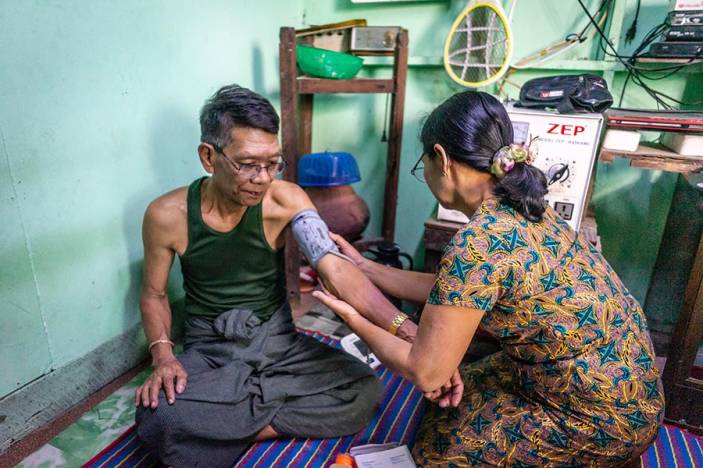 Universal health coverage must be fit for an ageing world
Universal health coverage must be fit for an ageing world
Camilla Williamson reflects on this year’s World Health Assembly and the journey towards inclusive universal health coverage.
The 72nd World Health Assembly (WHA) in Geneva ended last week. This year’s theme was universal health coverage (UHC).
While the increased visibility of ageing at this year’s WHA was welcome, it was clear that a great deal of work is still to be done to ensure older women and men are included in progress towards achieving health for people of all ages.
Universal health coverage
Universal health coverage means that people can access the health services they need, when they need them, without suffering financial hardship when paying for them.
During the week, HelpAge had the opportunity to make statements on progress towards achieving the Sustainable Development Goals (SDGs), including UHC. We called on WHO and UN member states to:
- develop life course models of UHC that are holistic and person-centred
- remove the barriers older women and men face in accessing appropriate, targeted health and care services
- ensure essential health service packages include those most needed to address health and care challenges common in older age
- close gaps in health insurance coverage and other support schemes to ensure access and affordability of service, and
- remove upper age caps from data sources underpinning efforts to monitor UHC.
It was positive to hear some member states raising the issues of older people and ageing in the context of SDGs and UHC across the week. This included Rwanda who spoke in debate on behalf of the 47 member states of the Africa to emphasise the importance of achieving health for all ages and meeting the needs of changing epidemiological trends. Brazil, Malaysia, Singapore and Vietnam also addressed ageing in formal statements.
However, in many debates, older people’s voices were absent and population ageing was disappointingly not addressed.
WHO leadership on ageing
This year we heard from Dr Naoko Yamamoto, the Assistant Director-general of Universal Health Coverage and Healthier Populations, whose brief includes ageing and older people.
Speaking at two events, Dr Yamamoto highlighted the urgent need for societies to respond to rapid demographic change and stressed the challenges but also the opportunities that this presents. Dr Yamomoto’s role will be critical in ensuring older people’s needs are addressed in progress towards achieving UHC and in delivering a successful Decade on Healthy Ageing. We are committed to working with her and her team on this important agenda.
The Decade of Healthy Ageing
We welcomed the side event on the upcoming Decade of Healthy Ageing, due to launch in October 2020 and run until 2030. The Decade offers a critical opportunity to continue the progress that has taken place in recent years on ageing at WHO and beyond, and to ensure that older people’s health and wellbeing is addressed in the broadest possible terms.
The event was organized by the delegations of Argentina, Canada, Chile, Costa Rica, Finland, France, Japan, Panama, Singapore, Slovenia and Turkey, all of whom made strong commitments to supporting the Decade’s success.
Most importantly, Leah Nzuamtemi Nzali, chair of the Morepeo Older Citizens Forum in Tanzania, joined the panel to share her experiences of ageing, health and care, and access to services. Leah’s presence ensured older people’s voices were heard at WHA. Leah Nzuamtemi Nzali said: “By 2030, I want to see a world where older people can easily access affordable, quality, age-friendly, health and care services”.
HelpAge will be working with WHO, member states and wider civil society organisations to ensure the voices of older women and men are at the centre of the Decade of Healthy Ageing.
The voices of older women and men
At the beginning of the week, WHO Director General, Dr Tedros Adhanom Ghebreyesus, opened the Assembly emphasising the need for us all to “listen to the voices of those who are not here. Those who have no voice. Those who have been left behind.”
As we progress UHC, we must ensure older people aren’t left behind. It is clear from the week that while some progress is being made on this, there is still a great deal to be done. As we approach the High-Level Meeting on UHC on 23 September we’re calling on heads of state to attend the meeting and commit to supporting the inclusion of older people in UHC efforts. UHC models must address the specific barriers older people face in accessing health and care services, whilst prioritising an integrated, holistic and people-centred approach that meets older women and men’s diverse needs.
Links
HelpAge statements on Agenda Item 11.4:
Implementation of the 2030 Agenda for Sustainable Development and Universal health coverage – Primary health care towards universal health coverage are available here.
Presentation on The Decade of Healthy Ageing is available here.
Dr Tedros’ opening address is available here.
